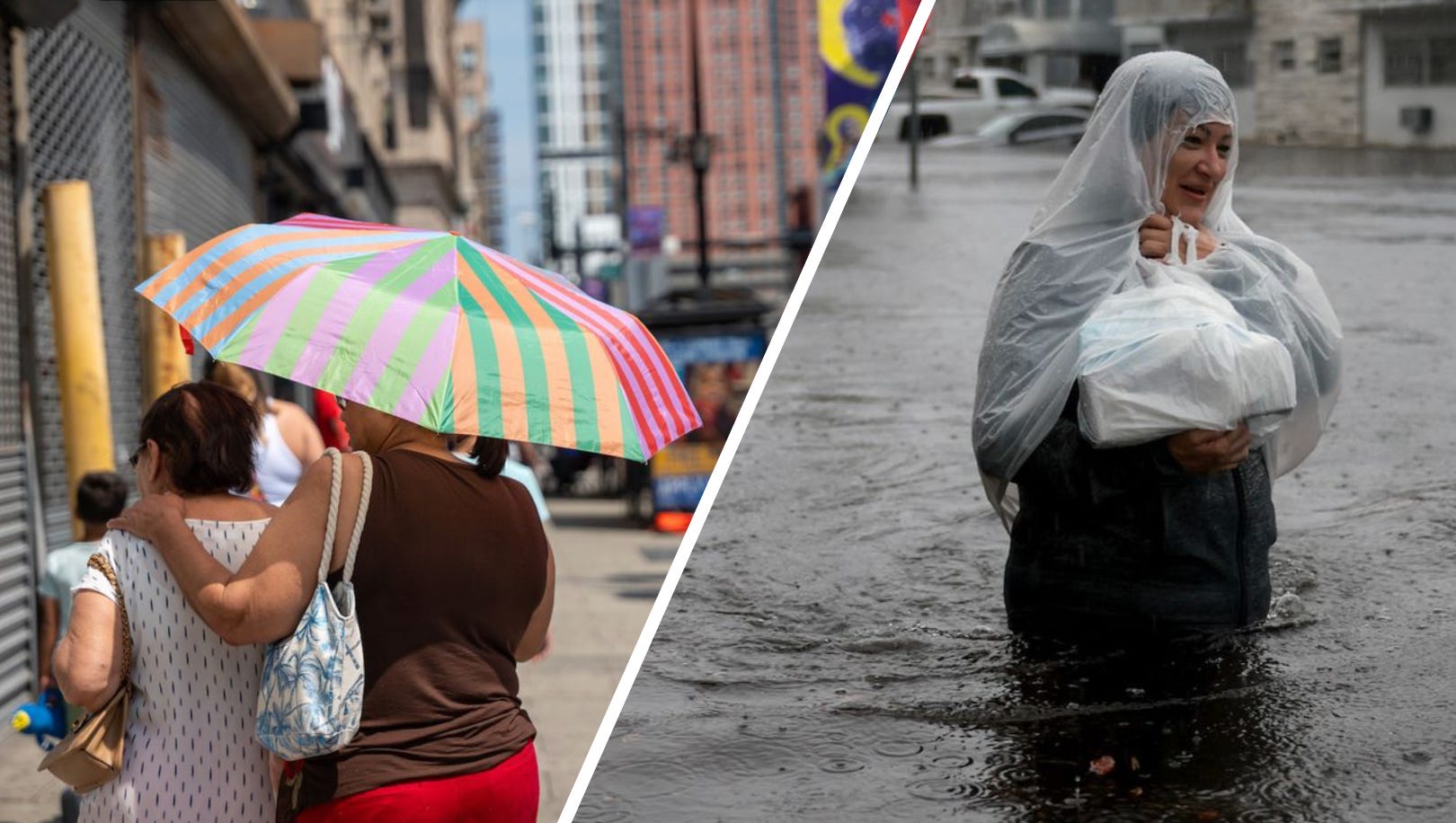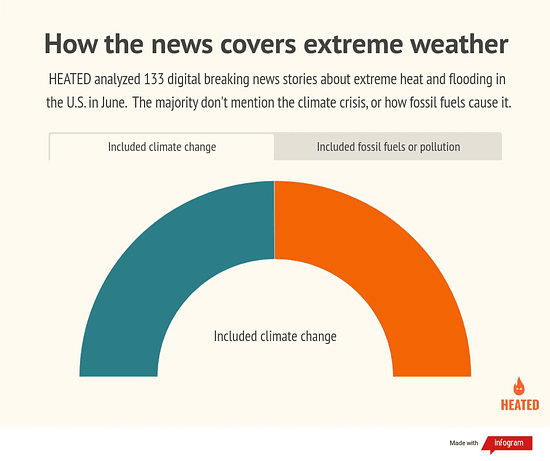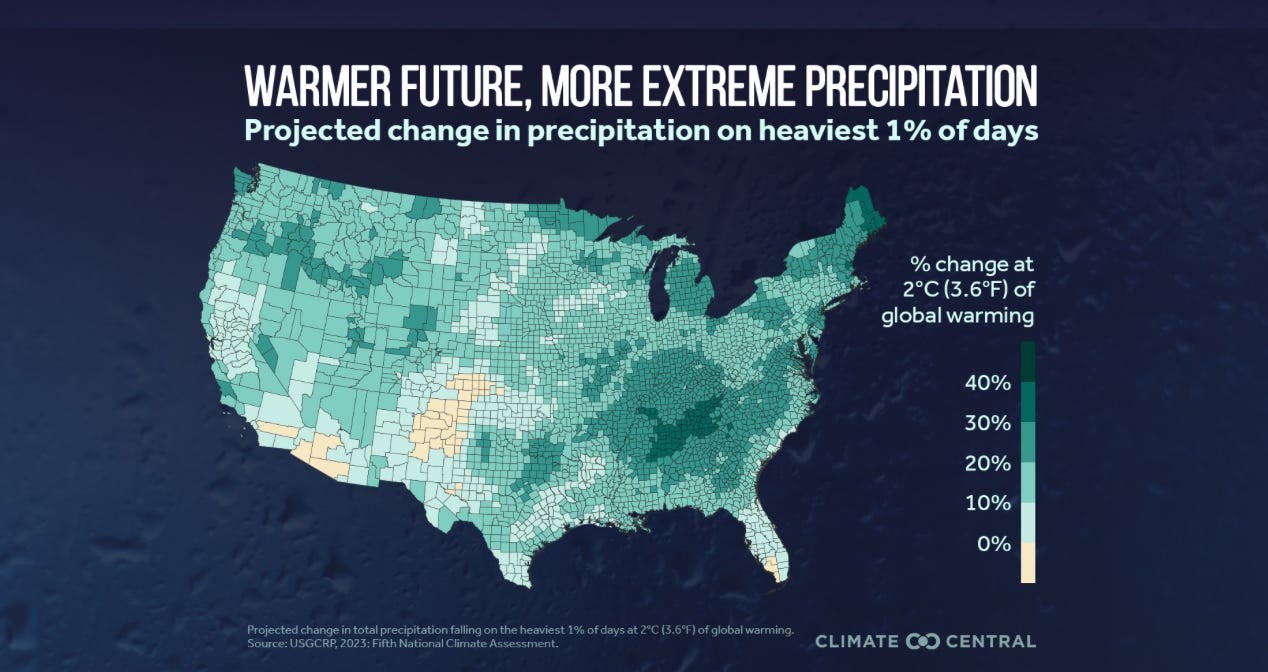The media is still falling short on climate
Welcome back to HEATED—Arielle here. This week, I spent two days combing through more than 130 breaking news stories on this month’s heat waves and flooding for dozens of phrases related to climate change or its causes. The results are a rare insight into what our industry includes—and leaves out—when it covers climate-fueled weather. We’re keeping this story free for all because we believe that journalism should be available to everyone. But if you have the means, please consider supporting our independent journalism by upgrading to a paid subscription today. Thank you for reading! The media is still falling short on climateHEATED analyzed 133 breaking news stories about recent climate-fueled weather in the United States. The results were dismal—but there were some bright spots.
The deadly heat waves and flash floods that have ravaged the United States this month are not normal, and they’re not natural. Record-breaking concentrations of heat-trapping gases in our atmosphere, driven primarily by fossil fuels, have not only made temperatures hotter. They’ve intensified the Earth’s water cycle, leading to stronger precipitation events. Yet despite clear evidence that carbon pollution is worsening heat and rainfall, the majority of breaking digital news stories about this month’s unprecedented weather don't mention the climate crisis at all. Instead, most mainstream outlets continue to write about these lethal, record-breaking events as if they were merely acts of God. According to a HEATED analysis of 133 national, international, and major regional digital breaking news articles about record-breaking weather in the United States this month, only 44 percent mentioned the climate crisis or global warming. Stories about heat waves fared slightly better, with 52 percent mentioning climate change. Only 25 percent of stories about extreme rainfall mentioned climate change. Even fewer stories about this month’s climate-fueled extreme weather explained to readers why the climate crisis is happening in the first place. Of 133 articles about unprecedented heat and flash floods, only 15 articles—or 11 percent—mentioned fossil fuels, the largest source of greenhouse gas emissions. Only one article, from the BBC, mentioned deforestation. No articles mentioned animal agriculture. Yet despite the dismal numbers overall, some news outlets stood out for consistently mentioning climate change in all their breaking heat and rainfall articles this month. Those outlets were numerous, but included NPR, Vox, Axios, the BBC, and Agence France-Presse (AFP). Some news outlets, however, stood out for never mentioning climate change in any of their breaking extreme heat or rainfall articles. Those outlets were ABC News, USA Today, The Hill, the New York Post, and Fox Weather. ABC News declined to comment on the record. But a source at the organization pointed to ABC’s extensive breaking television and digital video coverage of the heat and flooding events, which do connect them to climate change. HEATED’s analysis only covered written stories. The Hill sent four examples of recent stories about climate change in response to a request for comment. But none of them met the criteria for HEATED’s analysis, which only covers breaking or “day one” news. (Read on for more about our methodology). “The Hill has long taken the subject of climate change very seriously and has addressed it directly or mentioned it in related science and weather stories over the last several years,” said vice president and general manager Joseph Ruffalo. Fox Weather also sent us multiple examples of in-depth climate stories unrelated to this month’s heat waves or rainfall. “Since its inception in 2021, FOX Weather has covered all weather patterns both immediate and long term,” said a spokesperson for Fox Weather. Again, these stories did not meet the criteria for our analysis. Our analysis focused only on breaking stories because climate change is not a follow-up story; it is the story of the lethal and economically devastating extreme weather playing out across the country. To not mention climate change in a breaking news story about record heat in June 2024 is like not mentioning COVID-19 in a breaking news article about record hospitalizations in March 2020. It’s an abdication of journalistic responsibility to inform. USA Today and the New York Post did not immediately respond to requests for comment. The evidence for climate connection is “rock solid”The evidence for connecting worsening extreme heat and heavy rainfall to fossil fuels is “rock solid,” said Andrew Pershing, the vice president for science at Climate Central, a non-profit dedicated to communicating climate science to the public. “Both of those trends are very clearly related to the amount of CO2 in the atmosphere,” Pershing said. “And we would not have CO2 at this level if we hadn’t been burning a whole bunch of stuff for 150 years.” The science linking extreme heat to carbon pollution is particularly strong due to advances in attribution science, which uses observational data and statistical methods to figure out how likely and severe an extreme weather event would be today, compared to how it might have played out in an imaginary, unwarmed world. Through attribution science, researchers have already determined that climate change made this month’s lethal heat wave in the U.S., Mexico, and Central America 35 times more likely and 2.5 degrees F hotter (1.4 degrees C). But journalists don’t even need to wait for researchers to publish their own findings: If they want to figure out how climate change influenced a heat event, they can do it in real-time through Climate Central’s Climate Shift Index, which uses peer-reviewed methodology to map out how much climate change influences the temperature on a particular day. Similar tools that would allow reporters to see the real-time climate fingerprint of extreme rainfall events don’t yet exist. But the good news is, reporters don’t need attribution science to credibly say that extreme heat and heavy rainfall are being made worse by climate change. “The climate signal is so strong, every weather event is being driven by climate change at some level,” Pershing said. So why are so many news outlets still avoiding the obvious? The news stories that did it rightCommunicating climate science is not difficult. Many breaking news stories that we analyzed included detailed explanations of how pressure zones and rainfall patterns influence extreme weather events. If reporters and editors can understand that, they can understand the simple physics of how heat-trapping gases affect the atmosphere. In fact, some outlets we analyzed demonstrated the ease of communicating climate science in breaking coverage masterfully. For example, when The Guardian republished an Associated Press (AP) story about extreme heat, editors added one simple sentence: “Heatwaves are becoming more severe and prolonged due to the global climate crisis, caused primarily by the burning of fossil fuels,” the sentence read. (The Guardian confirmed with HEATED that the sentence was added by an editor.) Here’s a few more examples of outlets that described the climate impact of fossil fuels in one sentence:
Connecting extreme rainfall and climate change is also pretty easy, despite the fact that only 25 percent of news outlets did so. Those outlets were the AP, Axios, BBC, Bloomberg, Los Angeles Times, NPR, PBS (republishing the AP), and The Washington Post. Here are some examples of how media outlets easily explained the connection between extreme rainfall and climate change:
The particularly glaring omissionsBut most stories did not mention the link between pollution and extreme weather at all. In some cases, news outlets’ attempt to downplay the weather was unintentionally funny. For example, one New York Post story about the record-breaking heat wave made sure to include this quote from a New Yorker. “I’ve been in way hotter weather,” he said. “Kuwait, Iraq.” Other stories made sure to note that soaring temperatures and flooding were remarkable, unprecedented, or record-breaking—but then they inexplicably stopped short of mentioning the climate crisis as a possible reason. In one AP article about triple-digit temperatures in the Southwest, for example, a spokesperson for the Arizona Department of Forestry and Fire Management said, “It does seem like Mother Nature is turning up the heat on us a little sooner than usual.” The article did not explain why the deadly heat had arrived earlier in the season. In cases like these, the climate change omissions were so glaring that they seemed intentional. However, reporting breaking news on deadline is difficult; sometimes you just miss things. It happens all the time, including here. But when over half of breaking news articles about climate-fueled weather don’t mention the climate crisis, one has to wonder whether there are forces other than sheer ignorance driving these omissions. If you have insights that could help us answer that question, shoot us a line. We’d love to listen. Some notes on our analysisOur analysis looks at national, international, and major regional digital breaking news coverage of U.S.-based extreme heat and flooding events from June 1 to June 24. It’s not a complete or scientific analysis of this month’s news coverage; it’s very possible we could have missed things. But we did give careful consideration to the media outlets and stories we included, and the questions we asked. We also tried to be generous, counting news stories that indirectly mentioned climate change—or only referred to it in a quote—as ones that “mentioned climate change.” As in our previous media analyses, the point of this story is not to shame individual reporters or editors. It’s to examine how trends in news practices may contribute to widespread public misunderstanding about climate change. Only 58 percent of Americans understand that fossil fuels and other human activities cause climate change. And only 31 percent want to phase out fossil fuels, which scientists say is necessary to preserve a livable climate. Much of this public misunderstanding is surely because of powerful, politically-motivated climate disinformation—and that makes trustworthy, independent journalism more important than ever. So we urge our readers not to use this analysis to discredit or tear down journalists, but to encourage them to improve their industry—and by extension, our climate trajectory. Some numbers to keep in your pocket:
Catch of the day: Twins Miles and Macintosh, who reader Lydia adopted after their stray mom gave birth in her friend’s basement, just want to eat catnip and lounge. They also like to loaf with their older brother Ollie (wearing the green bow tie) while their human brother, Andrew, battles it out at COP28. Thanks for fighting the good fight Andrew! Want to see your furry (or non-furry!) friend in HEATED? It might take a little while, but we WILL get to yours eventually! Just send a picture and some words to catchoftheday@heated.world. You're currently a free subscriber to HEATED. For the full experience, upgrade your subscription. |
Older messages
What maniac jumbo sharks can teach us about climate change
Friday, June 21, 2024
Recognize reality and adapt—or get eaten. ͏ ͏ ͏ ͏ ͏ ͏ ͏ ͏ ͏ ͏ ͏ ͏ ͏ ͏ ͏ ͏ ͏ ͏ ͏ ͏ ͏ ͏ ͏ ͏ ͏ ͏ ͏ ͏ ͏ ͏ ͏ ͏ ͏ ͏ ͏ ͏ ͏ ͏ ͏ ͏ ͏ ͏ ͏ ͏ ͏ ͏ ͏ ͏ ͏ ͏ ͏ ͏ ͏ ͏ ͏ ͏ ͏ ͏ ͏ ͏ ͏ ͏ ͏ ͏ ͏ ͏ ͏ ͏ ͏ ͏ ͏ ͏ ͏ ͏ ͏ ͏ ͏ ͏ ͏ ͏
Trip balls, save the Earth?
Wednesday, June 19, 2024
I fell down the rabbit hole of Psychedelics for Climate Action. Then I came back to reality. ͏ ͏ ͏ ͏ ͏ ͏ ͏ ͏ ͏ ͏ ͏ ͏ ͏ ͏ ͏ ͏ ͏ ͏ ͏ ͏ ͏ ͏ ͏ ͏ ͏ ͏ ͏ ͏ ͏ ͏ ͏ ͏ ͏ ͏ ͏ ͏ ͏ ͏ ͏ ͏ ͏ ͏ ͏ ͏ ͏ ͏ ͏ ͏ ͏ ͏ ͏ ͏ ͏ ͏
How grassroots climate activists are taking on Big Tech
Thursday, June 13, 2024
In Virginia, a small conservation group is leading the fight against the powerful and secretive data center industry. ͏ ͏ ͏ ͏ ͏ ͏ ͏ ͏ ͏ ͏ ͏ ͏ ͏ ͏ ͏ ͏ ͏ ͏ ͏ ͏ ͏ ͏ ͏ ͏ ͏ ͏ ͏ ͏ ͏ ͏ ͏ ͏ ͏ ͏ ͏ ͏ ͏ ͏ ͏ ͏ ͏ ͏
If Trump can be convicted, so can Big Oil
Tuesday, June 11, 2024
Progressive prosecutors should be taking a more aggressive stance against fossil fuel companies, advocates argue. ͏ ͏ ͏ ͏ ͏ ͏ ͏ ͏ ͏ ͏ ͏ ͏ ͏ ͏ ͏ ͏ ͏ ͏ ͏ ͏ ͏ ͏ ͏ ͏ ͏ ͏ ͏ ͏ ͏ ͏ ͏ ͏ ͏ ͏ ͏ ͏ ͏ ͏ ͏ ͏ ͏ ͏ ͏ ͏
U.N. chief calls for global fossil fuel ad ban
Wednesday, June 5, 2024
The New York Times, one of the biggest purveyors of fossil fuel ads, did not respond to our request for comment. ͏ ͏ ͏ ͏ ͏ ͏ ͏ ͏ ͏ ͏ ͏ ͏ ͏ ͏ ͏ ͏ ͏ ͏ ͏ ͏ ͏ ͏ ͏ ͏ ͏ ͏ ͏ ͏ ͏ ͏ ͏ ͏ ͏ ͏ ͏ ͏ ͏ ͏ ͏ ͏ ͏ ͏ ͏ ͏
You Might Also Like
March's Guest Editor: Kim Addonizio
Friday, February 28, 2025
Thank you for supporting Poem-a-Day ͏ ͏ ͏ ͏ ͏ ͏ ͏ ͏ ͏ ͏ ͏ ͏ ͏ ͏ ͏ ͏ ͏ ͏ ͏ ͏ ͏ ͏ ͏ ͏ ͏ ͏ ͏ ͏ ͏ ͏ ͏ ͏ ͏ ͏ ͏ ͏ ͏ ͏ ͏ ͏ ͏ ͏
New and Old #203
Friday, February 28, 2025
Friday roundup and commentary ͏ ͏ ͏ ͏ ͏ ͏ ͏ ͏ ͏ ͏ ͏ ͏ ͏ ͏ ͏ ͏ ͏ ͏ ͏ ͏ ͏ ͏ ͏ ͏ ͏ ͏ ͏ ͏ ͏ ͏ ͏ ͏ ͏ ͏ ͏ ͏ ͏ ͏ ͏ ͏ ͏ ͏ ͏ ͏ ͏ ͏ ͏ ͏ ͏ ͏ ͏ ͏ ͏ ͏ ͏ ͏ ͏ ͏ ͏ ͏ ͏ ͏ ͏ ͏ ͏ ͏ ͏ ͏ ͏ ͏ ͏ ͏ ͏ ͏ ͏ ͏ ͏ ͏ ͏ ͏ ͏ ͏ ͏ ͏ ͏ ͏
Living seasonally
Friday, February 28, 2025
10 things worth sharing this week ͏ ͏ ͏ ͏ ͏ ͏ ͏ ͏ ͏ ͏ ͏ ͏ ͏ ͏ ͏ ͏ ͏ ͏ ͏ ͏ ͏ ͏ ͏ ͏ ͏ ͏ ͏ ͏ ͏ ͏ ͏ ͏ ͏ ͏ ͏ ͏ ͏ ͏ ͏ ͏ ͏ ͏ ͏ ͏ ͏ ͏ ͏ ͏ ͏ ͏ ͏ ͏ ͏ ͏ ͏ ͏ ͏ ͏ ͏ ͏ ͏ ͏ ͏ ͏ ͏ ͏ ͏ ͏ ͏ ͏ ͏ ͏ ͏ ͏ ͏ ͏ ͏ ͏ ͏ ͏ ͏ ͏ ͏ ͏
Are Voters Souring on the Trump Economy?
Friday, February 28, 2025
Trump is starting to pay a price for ignoring the issue that got him elected. ͏ ͏ ͏ ͏ ͏ ͏ ͏ ͏ ͏ ͏ ͏ ͏ ͏ ͏ ͏ ͏ ͏ ͏ ͏ ͏ ͏ ͏ ͏ ͏ ͏ ͏ ͏ ͏ ͏ ͏ ͏ ͏ ͏ ͏ ͏ ͏ ͏ ͏ ͏ ͏ ͏ ͏ ͏ ͏ ͏ ͏ ͏ ͏ ͏ ͏ ͏ ͏ ͏ ͏ ͏ ͏ ͏ ͏ ͏ ͏ ͏ ͏
“Amto remembers Hussein, Aljibbayn 1983” by Kamelya Omayma Youssef
Friday, February 28, 2025
When the martyr died in my arms, / I pleaded ͏ ͏ ͏ ͏ ͏ ͏ ͏ ͏ ͏ ͏ ͏ ͏ ͏ ͏ ͏ ͏ ͏ ͏ ͏ ͏ ͏ ͏ ͏ ͏ ͏ ͏ ͏ ͏ ͏ ͏ ͏ ͏ ͏ ͏ ͏ ͏ ͏ ͏ ͏
Imagine the space gossip
Friday, February 28, 2025
— Check out what we Skimm'd for you today February 28, 2025 Subscribe Read in browser Header Image But first: Is this man testing the Sabrina Carpenter curse? Update location or View forecast Quote
This Dreamy Dress Trend Will Be Everywhere In 3 Months
Friday, February 28, 2025
Fairytale moments from London Fashion Week. The Zoe Report Daily The Zoe Report 2.27.2025 This Dreamy Dress Trend Will Be Everywhere In 3 Months (Runway) This Dreamy Dress Trend Will Be Everywhere In 3
3x3: February 27, 2025
Friday, February 28, 2025
February is the worst month ͏ ͏ ͏ ͏ ͏ ͏ ͏ ͏ ͏ ͏ ͏ ͏ ͏ ͏ ͏ ͏ ͏ ͏ ͏ ͏ ͏ ͏ ͏ ͏ ͏ ͏ ͏ ͏ ͏ ͏ ͏ ͏ ͏ ͏ ͏ ͏ ͏ ͏ ͏ ͏ ͏ ͏ ͏ ͏ ͏ ͏ ͏ ͏ ͏ ͏ ͏ ͏ ͏ ͏ ͏ ͏ ͏ ͏ ͏ ͏ ͏ ͏ ͏ ͏ ͏ ͏ ͏ ͏ ͏ ͏ ͏ ͏ ͏ ͏ ͏ ͏ ͏ ͏ ͏ ͏ ͏ ͏ ͏ ͏ ͏ ͏ ͏
Should You Do Cardio Before or After You Lift Weights?
Thursday, February 27, 2025
View in Browser Men's Health SHOP MVP EXCLUSIVES SUBSCRIBE Should You Do Cardio Before or After You Lift Weights? Should You Do Cardio Before or After You Lift Weights? If you're combining two
This Google Tool Can Hide Your Personal Info From Search
Thursday, February 27, 2025
Alexa Is Getting an AI Upgrade. Take your privacy back from Google Search. Not displaying correctly? View this newsletter online. TODAY'S FEATURED STORY This Google Tool Can Help Hide Your Personal





